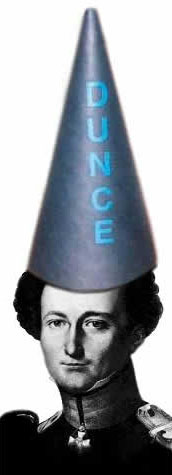
CORN, CRACKED
A Response to Tony Corn's
"Clausewitz in Wonderland"
by Christopher Bassford
I opened Tony Corn's stream-of-consciousness/theory-of-everything rant, "Clausewitz in Wonderland," with great interest. The fascination waned a bit when its only unifying themes turned out to be 1) a generalized assault on "guys named Carl" and 2), a sustained sneer at civilian academics (like, say, Tony Corn) who think they have something to teach soldiers and policy-makers. However, the latter discussion turned out to be a brilliant demonstration of its own key argument—i.e., that such academics have no strategic sense whatsoever. I mean, who else would put so much energy into unnecessarily alienating people like myself who, despite our interest in Clausewitz, might otherwise tend to agree with the main thrusts of one's own rant? Thus, Corn's accomplishment turns out to be truly Homeric—but only in the Matt Groening sense.
 A very great deal of what Corn says about dysfunctional thinking in America is, of course, quite true. Unfortunately, none of the annoyances he describes have much to do with the putative object of his attack. Clausewitz, who—NEWSFLASH!—has been dead for 175 years, is hardly responsible for the scientific, historical, and anthropological ignorance, or the political naiveté, that underlie our dysfunctional national strategic culture. The Clausewitzian observation that "war is a continuation of politics…" is nice and all that, but, if you have no viable definition of your own for what really constitutes "politics"; know nothing either of On War's historical context or of your own; have a delusory, social-science understanding (if that) of human nature; and know nothing of the specific politics in which a particular war is embedded (say, the politics of the Islamic world or, perhaps, the internal politics of Iraq), Clausewitz's input isn't going to prove very enlightening or useful. For strategists suffering from these debilities, "Clausewitzian war" serves only as a way to continue bad policy by other means.
A very great deal of what Corn says about dysfunctional thinking in America is, of course, quite true. Unfortunately, none of the annoyances he describes have much to do with the putative object of his attack. Clausewitz, who—NEWSFLASH!—has been dead for 175 years, is hardly responsible for the scientific, historical, and anthropological ignorance, or the political naiveté, that underlie our dysfunctional national strategic culture. The Clausewitzian observation that "war is a continuation of politics…" is nice and all that, but, if you have no viable definition of your own for what really constitutes "politics"; know nothing either of On War's historical context or of your own; have a delusory, social-science understanding (if that) of human nature; and know nothing of the specific politics in which a particular war is embedded (say, the politics of the Islamic world or, perhaps, the internal politics of Iraq), Clausewitz's input isn't going to prove very enlightening or useful. For strategists suffering from these debilities, "Clausewitzian war" serves only as a way to continue bad policy by other means.
Nor is Clausewitz responsible for the smothering political correctness that makes it virtually impossible even to discuss things like the strategic history of Islam. Personally, I am still recovering from the high-pitched institutional whining that ensued when I made remarks on that subject virtually identical to Corn's a few weeks ago at one of the nation's premier institutions for strategic education. And almost every PME effort to discuss the "anthropology" of Islam that I have experienced has immediately degenerated into an utterly irrelevant analysis of the finer points of Koranic theology. Corn makes some (seemingly) favorable allusions to the potential value to strategists of understanding modern evolutionary theory (i.e., to Richard Dawkins and his memes). Great stuff! But mention evolutionary theory to a US-government audience and you'll spend the next hour debating the Book of Genesis with folks on the right side of the room; a week later you'll be reading articles by lefties in the Washington Post accusing you of advocating new eugenics laws banning reproduction by racial minorities.
The errors Corn describes originate in American cultural attitudes that certainly do not derive from Clausewitz. Indeed, it is those cultural attitudes that drive the frequently ludicrous manner in which Clausewitz's ideas are used and taught. Those attitudes will not magically disappear once every copy of On War has been safely burned. If anthropology becomes the new strategic rage, then educators who may be "men of one book" (or even "men of one set of Cliffs notes") will be subjecting students to equally misleading doctrinal discourses on Margaret Mead. I'm not joking here: Read John Keegan's anthropological absurdities in his A History of Warfare, which are every bit as asinine as his comments on Clausewitz. (Incidentally, it looks as though Corn's own misunderstanding of Clausewitz's "trinity" comes from Harry Summers, not Clausewitz. Physician, heal thyself.) As Corn himself makes (semi-) clear, Clausewitz was a great mind. A military or political education that excludes him simply because Douglas Haig or Harry Summers got things wrong would be seriously defective.
There are a great many ideas in Corn's article that, however disjointed, are worthy of discussion. Rather than respond with my own theory-of-everything, let me focus briefly on Corn's very positive comments on thinking inside the US Marine Corps. Though I am evidently one of the "Clausewitzian petits maitres" Corn finds so objectionable, I know something at least about USMC doctrine, since I wrote virtually all of MCDP 1-1, Strategy and MCDP 1-2, Campaigning (not to mention the Aviation Operations and Reconnaissance manuals…) and small pieces of the current MCDP 1, Warfighting. The MCDPs did not spring full-blown from the pen of any academic, but emerged from an energetic debate within the Corps' leadership. They are, in fact, supremely eclectic works drawing on a vast array of ideas and influences. But only a poseur who had never even looked at the famous Warfighting manual's table of contents (for which I bear no responsibility whatsoever—its primary author, John Schmitt, is a self-professed "Sun Tzu guy") could write that they are "largely exempt from the Clausewitz regimen." Just look at the chapter and section titles of MCDP-1: "Nature of War," "Theory of War," "Friction," etc., etc. Or scan the source documentation. Clausewitz is by far the largest influence cited.
If you're unhappy with current American strategic culture—and who isn't?—why waste time and ink hurling insults at a long-dead German? Unless, of course, assaulting Clausewitz is just a cover for an agenda in which the truth is irrelevant. But then, what else might we expect from someone who believes that "good theory rests on lousy history"?
